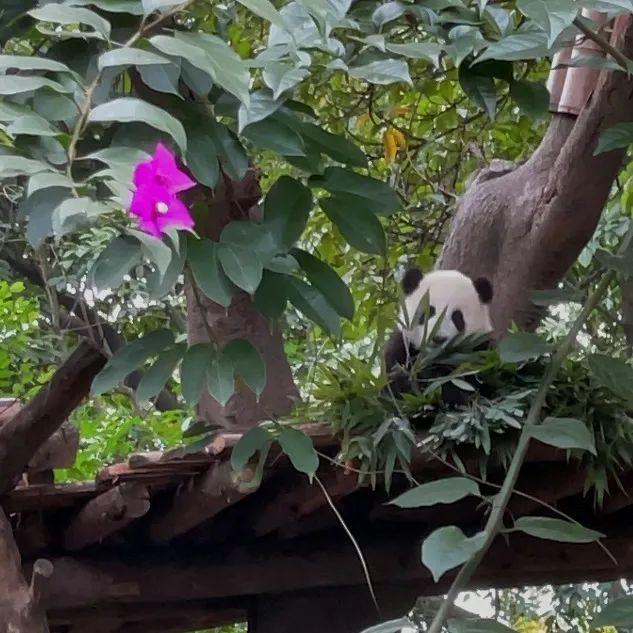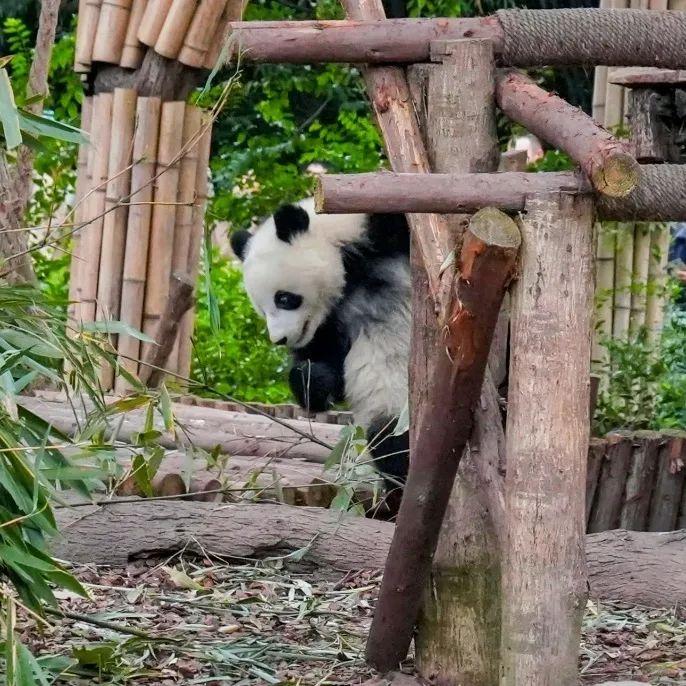From December 2nd to December 3rd, Harrow Nanning student ambassador representatives, parents and the SLT team came to Sichuan to go deep into the Giant Panda Nature Reserve and learn about pandas and ecological diversity protection from scientific researchers. After two days of study, the students gained a lot.


On the first day, teachers and students learned about the evolutionary history of pandas and the breeding and reintroduction of captive giant pandas at the Chengdu Giant Panda Breeding Research Base, guided by Ruan Tao, a teacher with years of experience in panda scientific research. Through Teacher Ruan’s introduction, students learned that the giant panda is a unique species to China, with a history of 8 million years, and also serves as China’s “cutest diplomat”. Many adorable pandas are currently “on business trips” around the world, acting as a bridge for cultural exchange between China and the world! On this day, students and teachers also understood that breeding pandas in captivity is an important method for their protection. However, the ultimate goal of panda conservation is to reintroduce these pandas into the wild, strengthening the wild panda population. Wild pandas usually live in dense forests, feeding on bamboo. The shrinking and fragmentation of their habitats due to other species and human activities pose threats to their survival and reproduction. Restoring panda habitats is a crucial measure to help reintroduce pandas to nature and strengthen the wild panda population.
In the Yingjing area of the National Giant Panda Conservation Park in Sichuan, there is a group of post-95 researchers, affectionately known as “Panda Poop Officers”, who have been silently contributing to the protection of giant pandas. They tirelessly work day after day to restore the pandas’ habitat, using their knowledge to analyze and monitor the living conditions of these pandas. On the second day, the students ventured deeper into the conservation area in Yingjing County, Sichuan Province, to further explore the protection of wild giant pandas. Under the guidance of Zhang Dongling and Song Xinqiang, the “Best Panda Patrol Officers” at the Yingjing Giant Panda Conservation Station, they gained firsthand understanding of the living conditions, habits, and diet of wild giant pandas. In addition to this, they learned that the giant panda is an umbrella species, meaning its habitat also supports many other rare species. Protecting giant pandas is synonymous with protecting biodiversity! The school’s teachers and students ventured into the mountains to experience a day in the life of a “Panda Patrol Officer”. The students learned how to install infrared cameras and understood the importance of restoring the giant panda’s habitat.

Ms Zhang Dongling and Mr Song Xinqiang emphasised that the work of “Panda Patrol Officers”, who are primarily field researchers, is incredibly challenging due to harsh outdoor conditions. They are required to conduct extensive data collection and analysis daily, making their work quite arduous and thus challenging to attract talents to the conservation area for panda protection. Currently, in the Daxiangling area, there are only about thirty researchers, most of whom are young scholars born after 1995. Despite their youth, they are responsible for nearly 10,000 hectares of ecological conservation work.
“Ecological conservation is not as simple as many imagine, and it cannot be solved solely with high technology”, they noted. The degradation of these habitats historically due to human activities like logging and construction has transformed the original forest ecosystems into ones dominated by bamboo or other shrubs. The high density of vegetation in these areas makes it difficult for animals to move through, and some areas have been replanted with dense monoculture plantations during artificial restoration efforts. These fast-growing economic tree species, with their high density, block sunlight, leading to the near absence of undergrowth. Such conditions are unsuitable for giant panda habitation.
“Habitat restoration for giant pandas is not an overnight task; it is a long-term, arduous process that requires significant time and manpower. We need to thin out high-density bamboo groves and shrubbery, replant missing trees, and continuously monitor and collect data on the restored areas. These are tasks that high-tech methods alone cannot accomplish. Therefore, the conservation area’s rangers have rooted themselves in the mountains, embracing a modest lifestyle, day after day, year after year, in their steadfast commitment. Their goal is to create a day when giant pandas and their friends can return to their natural homes. ” They call for more people to pay attention to the protection of giant pandas and contribute to natural conservation.
Representatives of Student Ambassadors, parents, and the senior management team of Harrow Nanning represented AISL Harrow Schools to claim nearly 800 square meters of panda habitat as a “practical base”, participating in the protection of giant pandas and other natural species. We warmly welcome more AISL Harrow schools’ students to focus on natural conservation and sustainable development, join in panda conservation efforts, apply their daily learnings in practice, and contribute to the conservation of giant pandas and the ecosystem alongside scientific researchers!
The 17 Sustainable Development Goals (SDGs) are the focus of Harrow Nanning School this academic year, and the school will actively promote students’ participation in the SDGs, encouraging them to utilise their strengths and actively participate in contributing to society.








